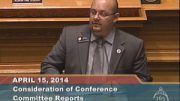Note: This article originally appeared in the September 2023 edition of MediaLawLetter, published by the Media Law Resource Center.
By Steve Zansberg
CFOIC President
Both Democratic and Republican party leaders in the Colorado House of Representatives agreed to a
Consent Decree on Sept. 1, 2023, in which they committed to distribute a formal directive to all
House members barring them from setting any device or app to auto-delete any electronic message
exchanged with another representative. The directive is the first in the nation to expressly prohibit
legislators from using so-called “ephemeral messaging” apps when discussing public business.
Two legislators challenge the status quo
The lawsuit that gave rise to the Consent Decree was filed by two first-term Democratic state
Representatives, Elisabeth Epps of Denver and Robert C. Marshall from Douglas County. Epps and Marshall sued their own party’s leader in the House, Speaker Julie McCluskie, and the Democratic Caucus, and her/their counterparts in the G.O.P. (and the entire House of Representatives), alleging ongoing and long-entrenched practices of conducting meetings in violation of Colorado’s Open Meetings Law (COML). The COML includes the House, its committees, and caucuses as “state public bodies.” Under the law, any gathering of two or more members of such bodies convened to discussed public business is required to be “open to the public,” and minutes of such meetings must be promptly recorded and made available to the public. In addition, prior to any meeting at which a quorum of any state public body, notice must be posted including an agenda.

Epps and Marshall pleaded that throughout the 2022-23 legislative session both the Democratic and Republican caucuses had conducted weekly meetings at which pending bills were discussed but without providing public notice or preparing minutes. Indeed, the complaint alleged that House staffers were expressly instructed not to place the weekly caucus meetings on the legislators’ official calendars.
The lawsuit also claimed that state legislators routinely used Signal, an ephemeral messaging app, to engage in discussions amongst themselves, even in the course of actual committee hearings (so called “meetings withing meetings”). Under the COML all electronic discussions are meetings that the public is entitled to observe in real time, and for which minutes must be prepared and made publicly available. Neither of those statutory requirements are satisfied when legislators discuss public business via ephemeral messaging apps. And the messages themselves automatically disappear (or “evaporate”) upon being read, so they are not available for public inspection under Colorado’s Open Records Act.
Finally, the lawsuit alleged that both Epps and Marshall had brought their concerns about COML violations to the attention of House leadership early in the 2022-23 term, in the hopes that changes would be made to discontinue those violations, but their entreaties were disregarded. The lawsuit asked for both preliminary and permanent injunctive relief requiring all state public bodies in the House of Representatives to comply with the COML.
A landmark deal is reached
Only seven weeks after the lawsuit was filed, the parties filed a Stipulated Proposed Consent Judgment and Decree. In it, the defendants committed to cease convening any meetings of a quorum of any caucus, committee or the House, without first providing public notice and thereafter providing the public with minutes.
In addition, defendants committed to cease discussing public business among two or more House members, using email or any text messaging app, where no minutes were kept and made publicly available. To effectuate this commitment, both Democratic and Republican House leaders committed to distribute a memo, within 10 days of the agreement, to their respective caucuses that mandates: “Members shall not set an automatic delete function on any electronic communications platform or application used to transmit electronic messages between the Members that discuss public business.”
Ephemeral messaging apps challenge records laws across the nation
Colorado is not the first state to confront the use of ephemeral messaging apps by public officials to evade state open records and meetings laws. However, the timing of its action was not strictly fortuitous: in July, the Colorado Freedom of Information Coalition released a report, entitled, “Disappearing Transparency: How Public Officials’ Use of Ephemeral Messaging Apps Undermines Open Government Laws.” See also, Kurt J. Starman, Student Comment: Now You See It, Now You Don’t: The Emerging Use of Ephemeral Messaging Apps by State and Local Government Officials, 4 Concordia L. Rev. 213 (2019).
The CFOIC report noted that public officials’ “use of apps that can automatically delete messages is becoming more prevalent” and “[b]ecause no records are kept, official communications that would otherwise be within the realm of document production laws are not subject to production because there is no existing record to be produced.” It recommended that Colorado adopt state legislation that prohibits government employees, at the state and local level, from using “encrypted” or “ephemeral” messaging apps to discuss public business.
Indeed, American Oversight, a Washington D.C.-based government transparency national advocacy organization, has identified the use ephemeral messaging apps by public officials as one of the three “Biggest Threats to Government Transparency in 2023.” For example, that group notes, “former Maryland Gov. Larry Hogan reportedly conducted official business using Wickr, a messaging app that can be set to delete messages after a set period of time. In August [2022], [American Oversight] asked Maryland’s attorney general to take action to prevent records of state officials’ communications from being destroyed by auto-deleting messaging apps.”
And, of course, the problem posed by these self-destructing messaging platform applies with equal force to the federal government. See, e.g. Thomas Kimbrell, James Valvo, and Kevin Schmidt, “Gone in an Instant: How Instant Messaging Threatens the Freedom of Information Act,” (Amers. for Prosperity Found. 2020) (reporting that “[t]hirteen of the sixteen [federal] agencies that produced their policies for the administration of [Instant Messaging] in response to our FOIA request do not preserve instant messages as a matter of policy—a violation of federal law and NARA guidance.”). Notably, the Electronic Message Preservation Act, 44 U.S.C. § 2912(a), mandates that the National Archives and Records Administration must promulgate guidelines requiring all federal agencies to preserve electronic communications that discuss public business.
Several states take action to preserve electronic records
The Consent Decree produced by the Epps and Marshall litigation is the first such formal commitment by a state legislature to foreswear the use of such apps, upon pain of contempt of court. But it is not the first governmental action directed to curtailing the use of such transparency-evading technology. Michigan House Bill 4778, passed into law in 2021, commands all state departments and agencies to issue directives barring employees from using any app or technology that prevents them from maintaining or preserving electronic public records as required by law. In Texas, Senate Bill 944, enacted in 2019, requires government officials to preserve text messages sent from or received on their personal devices that concern public or official business. However, the law does not directly address the use of disappearing or encrypted messaging apps.
Finally, in Kansas, Executive Order 18–06 requires all employees in the governor’s office to conduct official business exclusively on their official state email accounts, thereby effectively prohibiting them from using a disappearing or encrypted messaging app for official business.
Steve Zansberg, of the Law Office of Steven D. Zansberg, L.L.C. in Denver represented Rep. Elisabeth Epps and Robert C. Marshall. The House of Representatives, the Democratic Caucus, House Speaker Julie McCluskie, and Majority Leader Monica Duran were represented by Mark Grueskin and Trey Rogers of Recht Kornfeld, P.C. in Denver. The Republican House Caucus and Minority Leader Mike Lynch were represented by John Zakhem and Andrew Nickel of Jackson Kelly, P.L.L.C. in Denver.
Follow the Colorado Freedom of Information Coalition on Twitter @CoFOIC. Like CFOIC’s Facebook page. Do you appreciate the information and resources provided by CFOIC? Please consider making a tax-deductible donation.




